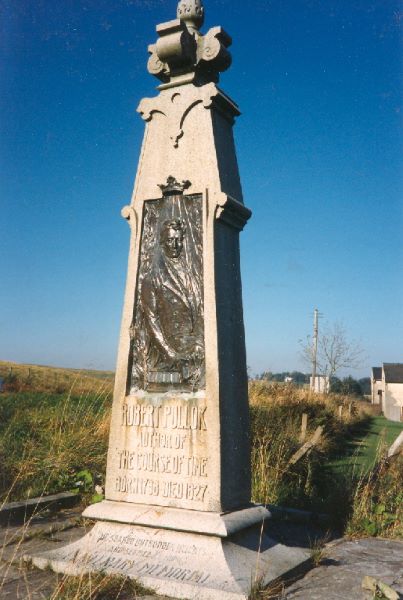

Robert Pollok
Robert Pollok
Robert Pollok (1798-1827) gained international fame in the 19th century as the author of The Course of Time. This epic poem had much in common with Milton’s “Paradise Lost”, with which it is often compared, but its religious outlook was quite different, as Pollok was a Calvinist with a Covenanter background. The book was published over and over, both at home and in the United States, throughout the 1800s. Unfortunately Pollok did not live to see its widespread success.
Early Life
Robert Pollok was born on October 19 1798, at North Moorhouse, Eaglesham. His father, John Pollok, was a farmer, first at North and then at Mid Moorhouse. His mother was Margaret Dickie, daughter of James and Margaret (Gemmell) of Horsehill. She was descended from Covenanters, and this was to have a profound influence on Robert. He was educated at home by his mother until the age of eight; from then until his fifteenth year he attended Mearns Parish School, under the tuition of Mr Andrew Jackson.
In 1815 Robert entered Fenwick School to prepare for college. Two years later he attended the College of Glasgow (later known as the University of Glasgow), studying Latin on the senior side under Professor Walker, and Greek on the junior side under Professor Young. He was known to have lodged at Crown Street and to have studied Moral Philosophy under Professor Mylne. In July 1820 he passed examination by the United Associate Presbytery of Glasgow for admission into the Divinity Hall of the United Secession Church, where he studied theology under the professorship of Dr Dick. By May 1827 he was licensed to preach the gospel, although in practice he was to deliver very few sermons.

Writing Career
Struggling to make ends meet, he started to write tales about the suffering of the Covenanters. These included Helen of the Glen (1823), Ralph Gemmell and The Persecuted Family and were published anonymously. His main work, however, was The Course of Time, which, at three and a half thousand verses, was written intermittently at Mid Moorhouse during December 1824 to July 1826.
Pollok wrote to his brother,
“It is with much pleasure that I am now able to tell you that I have finished my poem…I have succeeded, in almost every instance, up to my wishes; and in many places I have exceeded anything that I had conceived. This is not boasting remember. I only say that I have exceeded the degree of excellence which I had formerly thought of” (1).
The poem consisted of a long narrative filled with personal experiences and reminiscences, which many readers took to be autobiographical. However, it was also essentially a Calvinist version of Paradise Lost, in which Pollok wrote about the entry of evil into the world, sin and redemption. It is known that he was a keen reader of Milton’s work, but his own Presbyterian beliefs clashed with Milton’s departure from religious orthodoxy. The Course of Time was a deliberate attempt to write a poem “in which a Calvinistic poet shall represent his God” (2).
John Wilson, well-known literary figure and contributor to Blackwood’s Magazine, was a supporter of Pollok, and was instrumental in getting his work published by Blackwood’s early in 1827. The sum paid for the work reportedly amounted to £2500, which was apparently greater than any amount given to other contemporary writers of poetry, such as Sir Walter Scott.
Luckily, The Course of Time immediately began to sell; in 1828 Blackwood reported that it had sold 12,000 copies. By 1867, twenty-five editions had been published, and in 1868 the 78,000th copy was published in Edinburgh. More than twenty editions came from presses in New York, Boston and Philadelphia. It was also one of the earliest books published by Blackwook that was illustrated.
Sales of different editions were accompanied by glowing reviews:
The North American Review, April 1829: “A high place will be assigned him among the gifted sons of song” (3).
The Renfrewshire Magazine, July 1847: “an epic to be classed in the same category as the Iliad and Paradise Lost” (4).
Bell’s Messenger: “There has been no modern poem in the English language of the class to which the Course of Time belongs, since Milton wrote, that can be compared with it” (5).
It has been suggested that the poem was so popular because it chimed well with early 19th century sentiment. Pollok’s fondness for Nature, humble men and rural landscapes matched the Romanticism of the time. Moreover, the religious tone was appropriate to an age, where evangelicalism was strong, particularly in the United States. Some reviews singled out the strength of Pollok’s religious feeling as being particularly praiseworthy, rather than his writing skill and imaginative powers.
An Early Death
Unfortunately Robert Pollok suffered from ill-health, and, having contracted tuberculosis, a trip to the warmer climes of Italy for the winter was suggested. He left Scotland on August 15, 1827, accompanied by his sister. However, on arriving in London his health had greatly deteriorated. He travelled on to Shirley Common, Southampton, to stay until he would be able to travel abroad, but died on Tuesday, September 18, 1827. His last resting place was in Millbrook churchyard, two miles from Southampton, where an obelisk made of Peterhead granite proclaims, “His Immortal Poem is his Monument”.

On September 24 1900, a monument was unveiled to his memory at the junction of the main Glasgow-Kilmarnock road at Loganswell, three miles south of Newton Mearns.The inscription reads:
Robert Pollok
Author of the Course of Time.
Born 1798. Died 1827.
He soared untrodden heights
And seemed at home.
Centenary Memorial.
It also bears a bronze relief plaque, which depicts the young man John Wilson described as a true poet and gifted spirit.
References
(1) Wilson, James Grant. ‘Robert Pollok’ in Poets and Poetry of Scotland, Volume II, 1876, p196.
(2) Knowles, Julie Nall, ‘The Course of Time: A Calvinistic Paradise Lost’, Milton Studies, Volume XVIII, 1983, p179.
(3) and (5) Knowles, ibid., p173 and p175.
(4) Parker, Derek, ‘Forgotten Poet of the County’, Paisley Daily Express, Monday 17 February 1986, p4.
Further Reading
Knowles, Julie Nall, The Course of Time: A Calvinistic Paradise Lost, Milton Studies, Volume XVIII, 1983
Bell, Gilbert T, ‘Robert Pollok: A Man of Mearns’, The Mercury and Advertiser, 18 January 1968
Wilson, James Grant. Robert Pollok in Poets and Poetry of Scotland, Volume II, Harper, New York, 1876
Colville, William (Rev.) Eaglesham in The New Statistical Account of Scotland: Volume VII, Renfrew-Argyle, William Blackwood & Son, 1845
Parker, Derek, ‘Forgotten Poet of the County’, Paisley Daily Express, Monday 17 February 1986, p4.
Papers and manuscripts by, and relating to, Robert Pollok are held in the Special Collections department of Glasgow University Library
